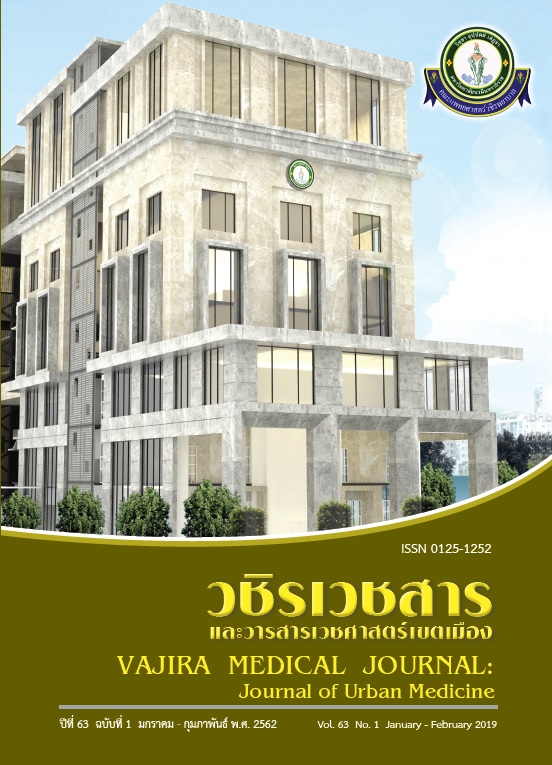A Study of the Relationship Between Dietary Habits and Body Mass Index of Faculty of Medicine Vajira Hospital, Navamindradhiraj University Personnels
Main Article Content
Abstract
Objective: To study 1) The knowledge and dietary habits of personnel Faculty of Medicine Vajira Hospital, Navamindradhiraj University 2) body mass index of personnels 3) relationship between dietary habits and body mass index.
Methods: The sample used in this study were personnels of Faculty of Medicine Vajira Hospital, Navamindradhiraj University. The survey was conducted on 297 samples who were nonmedical and nurses personnels. Simple Random sampling method was used. The tools were foods and nutrition knowledge, dietary habits and nutritional status questionnaire. Data were analyzed by using frequency, percentile, mean and standard deviation. To study relationship analysis, correlation coefficient analysis was used.
Results: The study revealed that 66.00% of Faculty of Medicine Vajira Hospital, Navamindradhiraj University personnels had very good nutrition knowledge, 13.10%, 12.10%, 6.70% and 2.00% had good, moderate, passing and not passing, knowledge respectively. The food consuming dietary habit was in good 52.50%, 38.00% in moderate, 7.40% in very good, and 2.00% was in fair in orderly. 50.20% of the group had normal nutritional status, while 40.70% and 9.10% were over nutrition and low nutritional status respectively.
Conclusion: The study of the relationship between nutrition knowledge and consumption behavior revealed that there was a significant relationship between the two variables at significant level of 0.05
Downloads
Article Details
References
2. World Health Organization (WHO). Body Mass Index. Available at: http://www.euro.who.int/ nutrition. Retrieved November 4,2017.
3. Bangkok Health Research Center. Skim Milk. Available at: http://www.bangkokhealth.com/health/article/skimmilk-2162. Retrieved November 4, 2017.
4. Department of Health, Ministry of Public Health. Knowledge for the people. Working age. 2010.
5. Social Security Office and Faculty of Public Health, Mahidol University. 2009. Social Security Program Guide Including weight loss prevention in the workplace. Faculty of Public Health, Mahidol University.
6. Boonteuan K. 2013. Eat - How to be skinny. Available at: http://www.bangkokbiznews.com/news/detail/521067. Retrieved January 10,2018.
7. Sutasunthorn D. Factors Affecting Health Promotion Behaviors Concerning Food Consumption among Nursing Staffs in Phramongkutklao Hospital. Graduate School Kasetsart University. Bangkok; 2003.


